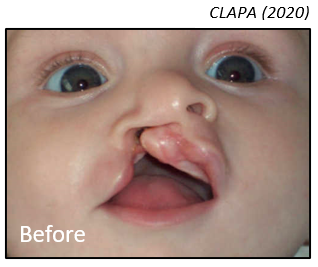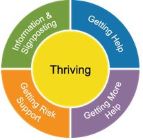
What is a cleft lip and palate?
A cleft is a gap in the upper lip and/or roof of the mouth (palate). Cleft lip and palate is relatively common. Around one in 700 children in this country are born with a cleft lip and/or palate. A cleft happens because different areas of the face don’t join together properly while a baby is developing in the mother’s womb. There is no known cause for this.
Babies can be born with a cleft lip, a cleft palate or both. It may affect one side of the lip/palate (unilateral) or both sides (bilateral).
The Cleft Lip and Palate Association (CLAPA) is the UK-wide voluntary organisation which helps those with, and affected by, cleft lip and palate. Their website provides lots of useful information for parents and professionals: www.clapa.com
When will I find out if my baby has a cleft lip/ palate?
A cleft in a baby’s lip can be diagnosed antenatally at the 20-week scan. A cleft in a baby’s palate will usually be diagnosed within 24 hours of birth.
Some children present later in childhood when they start talking, with speech that sounds as if they have a cleft palate (air coming down the nose when talking or difficulties making sounds at the front of the mouth). This is known as a velopharyngeal speech disorder. In this case, your child will be seen at the Nasality Clinic by a specialist speech therapist in Shropshire. The therapist will help to find out what kind of therapy is required and whether onward referral is required.
Which professionals will help me and my baby?
The medical professional who diagnoses a cleft lip/ palate will make a referral to the West Midlands Regional Cleft Centre at Birmingham Children’s Hospital. A specialist nurse from this Centre will be in touch in the first few days to support you with feeding your baby. At Birmingham Children's Hospital you will meet the consultant who will carry out operations to repair your baby’s cleft lip/ palate. A cleft lip is usually repaired at around 3 months and a cleft palate between six and ten months of age.

The Cleft Team at Birmingham Children’s Hospital is made up of surgeons, audiologists, speech therapists, orthodontists and psychologists. Your child will be seen for regular checks to make sure that his/her operation has worked well and to monitor his/her progress with hearing, speech, dental development and wellbeing. Following your baby’s operations, a referral will also be made to the local speech and language therapy department here in Shropshire.
You will be contacted by one of the therapists from the Shropshire Cleft Team:

It is our job to monitor your child’s progress with talking and offer you support and advice. In the early years we will visit you at home and will go on to offer appointments in clinic or in school as required. We liaise closely with the Cleft Team at Birmingham Children’s Hospital so that we can offer more intensive therapy at the right time and also help to make decisions about the need for further surgery.
Where can I find support from other parents?
CLAPA’s Parent and Peer Supporters are trained volunteers who can help you talk through any problems, worries or questions you have about cleft lip and palate. You can find out more at CLAPA.
Will my child need speech therapy?
Around half of all children with a cleft palate will need some form of speech and language therapy to achieve clear speech. This is because being born with a cleft palate can make it more difficult to produce certain speech sounds. Some children will only need a short course of therapy, while others will need longer and more intensive support to help them to speak clearly.
Occasionally, further surgery is recommended to help children sound less nasal by reducing the amount of air which escapes through the nose when they talk.
Top Tips
How can I help my child with talking?
We recommend this Babble Advice Video from the University Hospitals Bristol and Weston NHS Foundation Trust. It was made by our colleagues in Bristol and demonstrates lots of ideas and activities for early speech sound development.
‘The Sound We Found’ - Book by Helene Somerville, Lisa Farquhar, and Rhian Hoccom
More links and leaflets
The BBC Tiny Happy People has produced some information on cleft lip and palate.
Link to the iThrive document which gives an overview to clinical staff, local authorities, parent & carer groups, third sector and voluntary organisations, schools, nurseries and parent & carers of current support, signposting, services and treatment available to children and young people, with cleft palate / velopharyngeal incompetency, across Shropshire, Telford and Wrekin.





